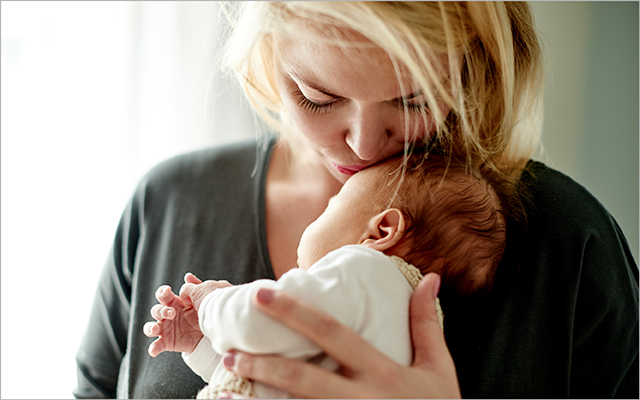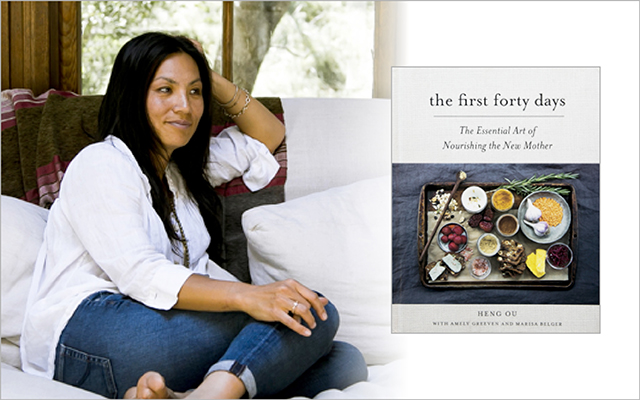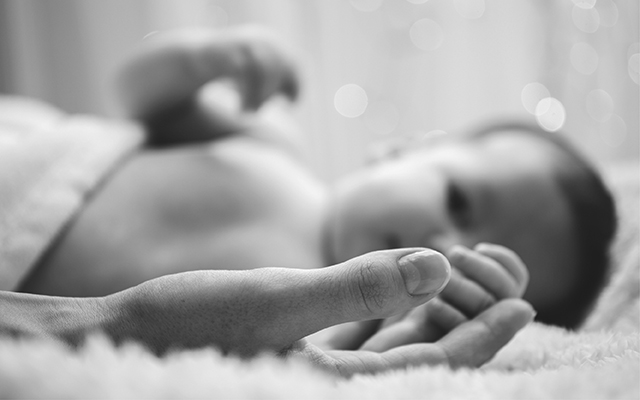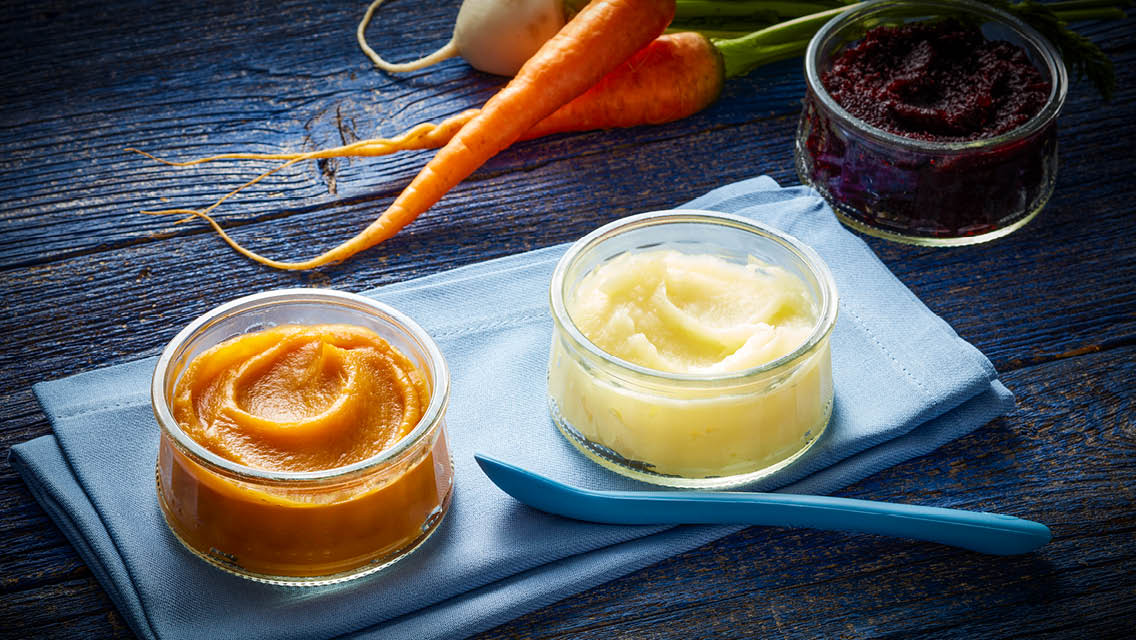As a new mom, I found postpartum to be a shocking series of events with my hormones, body, and emotions. Navigating this period of life on sparse sleep — and unrealistic expectations — I not only floundered but felt like I drowned within a few days.
Unable to hide my emotions and experience, I started being intensely honest with those around me. What I found was a chorus of other women voicing similar experiences — isolation and intense overwhelm.
I celebrated when celebrities like Chrissy Teigen and Tammin Sursok shared their raw and honest stories because it felt like the secret veil of postpartum was being torn down.
I often ask myself why postpartum depression and anxiety aren’t discussed more widely. Is it shame? Fear of freaking out other women? Something else?
I think it’s high time to shed light on this life-altering time in women’s lives. I recently had the honor of chatting with Aviva Romm, MD, about some of my most pressing questions, like how hormones are altered in postpartum, how long it takes your system to reregulate, how to handle postpartum depression and anxiety, and ways to support yourself during this period.
I hope that some of her answers can bring ancient women’s wisdom to the forefront by arming moms with basic, essential information about what is happening in their bodies. And that maybe, as a culture, we can try to understand the necessity of honoring that.
EL | How are women’s hormones altered during postpartum?
AR | The postpartum hormone drop is considered the single largest sudden hormone change in the shortest amount of time for any human being, at any point of their life cycle.
During pregnancy, our estrogen and progesterone increase to [the] level of something like taking a hundred birth-control pills a day. By about three days postpartum you’re essentially back to a baseline that is close to non-pregnant. So if you can imagine, it’s sort of like PMS on steroids, or something like that. It’s just so sudden. Estrogen and progesterone are going from so escalated to normal that it can cause huge emotional changes.
EL | How long does it take for things to reregulate, especially if you’re breastfeeding?
AR | Your estrogen and progesterone by about the end of that first week should be kind of closer to your baseline of what you are when you’re non-pregnant. But then your oxytocin goes up. That should ideally make us feel pretty well and happy, but it has to be enough to counterbalance that huge drop.
If you’re breastfeeding your cycle could be very inconsistent and irregular — for a year or more having cycles where you don’t ovulate and your hormones don’t reach peaks and dips that they usually would, and that others would.
There’s also a lot going on that impacts hormone balance, with varying levels of intensity for different women depending on the support they have in their lives, stress about going back to work, etc. Even in the best of circumstances, most of us are losing sleep, experiencing new anxiety and concerns over our baby, and making a whole lot of internal emotional adjustments.
EL | Are there other things a woman can do to support her body to heal during postpartum besides having the physical support of people around?
AR | Definitely. Probably one of the most important things I think we can do is actually make sure that we’re doing something called “sleep banking,” which is a really weird concept but proven to be effective. It works like this: If you lose sleep it’s very hard to catch up on the loss of sleep and bring your body back to rested. Sleep banking is the idea that if you pre-sleep, you can store reserves of energy. How can you do this? When baby naps during the day, that’s when we get our time to do everything else that we couldn’t do while we were holding the baby. So we tend to not catch up on sleep, and we tend to not sleep bank. But if you can make it a committed habit, even if it’s just a few times a week — to nap when the baby naps, even if you’re getting about 40 minutes of sleep — you can actually, not completely, but you can preempt some of the impact of the lost sleep by sleeping ahead. Sleep when baby sleeps even though it’s so tempting to do other stuff during that time. That 40 minutes of sleep can make a huge difference in your healing and your life!
EL | What if you’re pumping when the baby’s sleeping?
AR | You don’t have to pump when the baby’s asleep. You could pump while the baby’s awake, between or after feedings, for example.
EL | Besides sleep banking, are there other things?
AR | Making sure that your diet is really spot-on, never letting yourself skip meals or let your blood sugar drop. Each meal should contain good protein and good-quality fats. Keeping that blood sugar steady can keep your moods steady, help you sleep better, keep your energy up, and also help you keep your metabolism healthy so you can lose that baby weight, too.
EL | Why do some women continue to gain weight postbirth and while breastfeeding, or have trouble losing baby weight?
AR | I look for a couple of underlying causes. Number one is fatigue, which does two things: It raises our cortisol, which can make us hold weight, and both fatigue and elevated cortisol in turn make us crave – and eat – more sugar and more carbs, which can actually make us more tired in the long run and not lose weight. Next, and super important, is hypothyroidism. If I’m working with a new mom who’s having pretty significant trouble losing weight, I do a full thyroid assessment to make sure there is not a thyroid problem.
EL | All labor is intense, but does the length or strenuousness of labor have an impact on your hormones and healing?
AR | Not necessarily. I would say if you have a complication in labor, that could make it harder. Certainly a C-section [takes longer] — you have to heal from major abdominal surgery, you’ve had antibiotics, IV fluids, and perhaps an emotionally painful road if you were strongly hoping for a natural birth.
A woman’s experience of labor and birth can have a tremendous impact on hormones and healing. If a woman had a sense that her labor was really traumatic and that she doesn’t have the support and outlet for addressing that afterwards, that might have more of an impact on her healing.
EL | What’s the range of time it takes women to heal from pregnancy to childbirth?
AR | Physically, your uterus goes back to its pre-pregnant size and your hormones generally return to a baseline of more normal in about eight weeks. But I think we conflate physical healing with “back to normal,” and those are two different things.
The way postpartum is defined medically is that it ends at eight weeks. Historically what’s happened is, the rest of the world says, “Oh, well, eight weeks, you’re not postpartum anymore, so hey honey, you are back to work, you are back to normal. The support is gone. You should be back on your feet by now, you’re fine.” That’s sort of the MO, and yet the emotional adjustment is continuing to happen, you’re continuing to lose sleep. You may start to lose more sleep around eight weeks when the baby starts to get colicky, or around six months or eight months when the baby starts teething. So we need to really give ourselves that full year for complete adjustment.
If the baby’s breastfeeding, that means that there’s a lot going on psychologically and emotionally that we’re still adjusting to. If a woman had perineal trauma, or an episiotomy, or a C-section, it can take months and months and months for her to feel like she’s regained her strength and her tone.
And if she has a significant diastasis recti, she might feel limited in what exercises she can do, or she might be afraid. I’ve had women who have come to me and say, “I was afraid my organs were going to pop out, so I didn’t exercise as much.” So if she’s not sort of getting her life back, normal everything can still feel totally topsy-turvy for a long time.
EL | Do you think that there’s been an increase in postpartum anxiety and depression, or just an increase in awareness?
AR | Both. We know that rates of depression in the general society have tripled in the past decade or so, and one in 10 Americans is now on an antidepressant. Somewhere between one in four to six women is on an antidepressant, so those rates are much higher for women. Across the board, anxiety has gone up in our culture. In fact, we know now that there are almost 200,000 kids under the age of 2 years old on medications for anxiety, depression, or mood.
So overall there’s definitely been just this huge escalation of anxiety and depression, and women who have anxiety and depression before pregnancy are much more likely to have it during and after pregnancy. It’s one of the warning signs that we look for, to be aware of women who are at risk for postpartum depression.
And at the same time, fabulously, some celebrities are coming out about postpartum depression. More people have become more forthcoming about talking about it, and the medical community has become more aware of the need to pay attention to and screen for it. It’s not always being done as well or as often as it should with as much awareness as it should be, but overall I think, yes, we have way more of it, and also that it’s being identified more, and it’s being treated more. So it’s kind of a double-edged sword in a way.
EL | Do you have any tips on how women can get through that anxiety?
AR | Getting support postpartum is critically important — finding someone to talk to so that you’re not keeping it all in. One of the things we know is that talking with someone about our stress actually increases our oxytocin and decreases anxiety and depression, so just talking with anyone about it is really helpful. Realizing that you’re not alone and that this is — even though it’s not comfortable — somewhat normal. It’s a big deal to be a new mom.
For women who have a history of postpartum anxiety and postpartum depression, I start way ahead of time making sure they’re getting essential fatty acids and B complex. I check their MTHFR status. I make sure that they have really, really good support on tap.
And then there are some things particularly for depression that can be done — light therapy using the light box and some herbs that have been used, like St. John’s Wort and motherwort, that can help a woman get through it as well. Staying well-fed and well-rested. Low blood sugar causes anxiety, and lack of sleep causes anxiety and depression.
EL | Do you have any tips for a partner or family member who wants to help?
AR | I would check in on how you can help with the older kids, how you can help with housework. Getting a special little gift for the mom just for herself. Maybe mom would want a gift certificate to have someone to come to her house and give her a massage, a (sexy and comfortable) new bathrobe or nightgown, or something lovely just for mom can really make a difference in feeling supported.
Ask mom what she needs, or if she would like the gift of some postpartum care. Friends could all chip in and get that for her if the cost is too much. Ask her if she would like some time alone where somebody can come and watch baby for an hour and a half so that she can get a shower without worrying about the baby. Having 45 minutes to read a book or [even] brush your teeth might just be enough.
[Giving the gift of a] housekeeper for that first three months coming in for two hours once a week just to do some of the nitty-gritty stuff. Anything like that that can take the edge off for the mom can be huge.EL | Do you find that bodywork, including abdominal massage, acupuncture, and a chiropractor, help support during postpartum?
AR | Absolutely. First of all, if you’re getting any of these, it means that you’re getting an hour to yourself! That in itself can do wonders.
It’s so easy to start [to get] the nursing-mom shoulder, holding-the-baby shoulder, sleeping in funny positions if you co-sleep — all of that stuff affects your posture, and that can start to make you hold more tension in your body. So it can be tremendously helpful. But then also, for chiropractic, for example, if you had any kind of sciatica, or if your hips aren’t feeling quite right, or your back is uncomfortable, all of that can be really helpful. (Read more about “How Massage Can Heal the Mind and Body“.)
EL | What would you recommend for exercise specifically?
AR | I think getting out and walking with the baby is great, because that’s a great way to calm and relax baby and you. Postpartum yoga can be fabulous. You can do a yoga class on your own, or you can do a new mom yoga class.
A new mom yoga class can be a great source of support because women are going to start to talk about what’s going on for themselves. Pretty much everyone is still going to have a little bit of a new mom belly and it starts to be a little bit normative.
If you did exercise before, pick that up when you’re ready and give yourself a break to ease into it more gently. Usually I recommend not picking it up until you’re back to your full level of activity and until your bleeding has been completely stopped for two weeks, because it can pick up your postpartum bleeding if you start over-exercising. So that’s a good indication. If your bleeding stops, and then you start exercising and your bleeding comes back, then you might be overdoing it a little bit, so back down to where you were before.
EL | What are your top tips for somebody who’s entering postpartum or during postpartum?
AR| Have support set up ahead of time. Set yourself up for the reality that being a new mom, as natural as it might be, is not usually ‘easy peasy’ no matter what your friends or neighbors might say. Keep taking your prenatal multi and fish oil because they will give you a little boost of nutrients and eat well. Rest. Rinse and repeat. Using postpartum herbal baths (if you’ve had a cesarean, talk with your midwife or doctor first) can be nice also. Most importantly, be gentle with yourself, and be very open about asking for help. It’s a steep learning curve that so many women do in isolation. It’s never been that way historically throughout most of the world, and it should not be for you now, either.





This Post Has One Comment
Excellent interview! I shared it with a postpartum client of mine and she shared it with two of her friends who are also postpartum.
Very helpful!